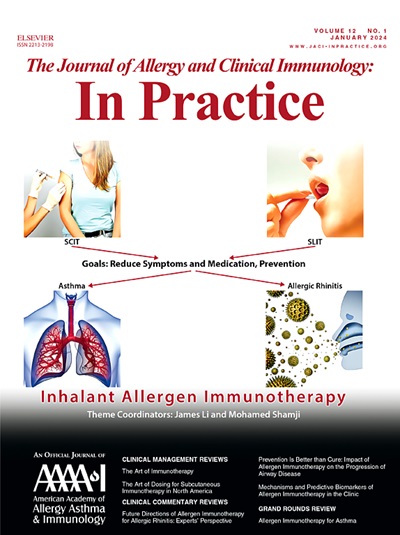溴化双百科、糠酸莫米松和联合用药治疗持续性变应性鼻炎的随机比较。
IF 8.2
1区 医学
Q1 ALLERGY
Journal of Allergy and Clinical Immunology-In Practice
Pub Date : 2025-03-01
DOI:10.1016/j.jaip.2024.12.035
引用次数: 0
摘要
背景:中度至重度持续性变应性鼻炎(AR)造成了巨大的社会经济负担。目的:我们旨在确定溴化双胍(BCQB)鼻喷雾剂和BCQB联合糠酸莫米松鼻喷雾剂(MFNS)治疗中重度持续性AR的优越性。方法:在这项多中心随机对照临床试验(NCT05038202)中,中度至重度持续性AR的成人患者被随机分配接受BCQB、MFNS或联合治疗,为期4周。记录每日反射性流鼻水、鼻塞、打喷嚏、鼻痒评分、鼻总症状评分(TNSS)和鼻结膜炎生活质量问卷(RQLQ)评分较基线的平均变化。还评估了探索性终点和不良事件。结果:与MFNS相比,BCQB在4周治疗期间显著改善了每日反射性流鼻涕的基线平均变化(最小二乘[LS]平均差值,-0.27;95%置信区间[CI], -0.44 ~ -0.09;P = 04)。与单独MFNS相比,BCQB联合MFNS显著改善了流鼻涕、鼻塞、打喷嚏、TNSS和RQLQ评分,但鼻痒除外。BCQB显著降低了嗜酸性阳离子蛋白、eotaxin、血管活性肠肽和白细胞介素-6水平的百分比变化。三组治疗后出现的不良事件相似。结论:BCQB在减轻日常流鼻涕症状方面优于MFNS。在缓解以流鼻涕为主要症状的中重度持续性AR患者的TNSS方面,BCQB联合MFNS优于单独MFNS。本文章由计算机程序翻译,如有差异,请以英文原文为准。
A Randomized Comparison of Bencycloquidium Bromide, Mometasone Furoate, and a Combination for Persistent Allergic Rhinitis
Background
Moderate to severe persistent allergic rhinitis (AR) poses a substantial socioeconomic burden.
Objectives
We aimed to establish the superiority of bencycloquidium bromide (BCQB) nasal spray and BCQB combined with mometasone furoate nasal spray (MFNS) over MFNS alone in adults with moderate to severe persistent AR.
Methods
In this multicenter, randomized, controlled clinical trial (NCT05038202), adults with moderate to severe persistent AR were randomly assigned to receive BCQB, MFNS, or a combination treatment for 4-week periods. Mean changes from baseline in the daily reflective runny nose, nasal congestion, sneezing, nasal itching scores, total nasal symptom score (TNSS) and Rhinoconjunctivitis Quality of Life Questionnaire scores were recorded. We also assessed the exploratory end points and adverse events.
Results
Bencycloquidium bromide led to a significant improvement in the mean change from baseline in daily reflective runny nose during the 4-week treatment, compared with MFNS (least-squares mean difference, –0.27; 95% CI, –0.44 to –0.09; P = .004). The BCQB combined with MFNS significantly improved runny nose, nasal congestion, sneezing, TNSS, and Rhinoconjunctivitis Quality of Life Questionnaire scores compared with MFNS alone, except for nasal itching. Bencycloquidium bromide significantly decreased the percent change in eosinophilic cationic protein, eotaxin, vasoactive intestinal peptide, and IL-6 levels. Treatment-emergent adverse events were similar among the three groups.
Conclusions
Bencycloquidium bromide was superior to MFNS in reducing daily runny nose symptoms. The combination of BCQB and MFNS was superior to MFNS alone in alleviating TNSS in patients with moderate to severe persistent AR with a predominant symptom of runny nose.
求助全文
通过发布文献求助,成功后即可免费获取论文全文。
去求助
来源期刊

Journal of Allergy and Clinical Immunology-In Practice
ALLERGYIMMUNOLOGY-IMMUNOLOGY
CiteScore
11.10
自引率
9.60%
发文量
683
审稿时长
50 days
期刊介绍:
JACI: In Practice is an official publication of the American Academy of Allergy, Asthma & Immunology (AAAAI). It is a companion title to The Journal of Allergy and Clinical Immunology, and it aims to provide timely clinical papers, case reports, and management recommendations to clinical allergists and other physicians dealing with allergic and immunologic diseases in their practice. The mission of JACI: In Practice is to offer valid and impactful information that supports evidence-based clinical decisions in the diagnosis and management of asthma, allergies, immunologic conditions, and related diseases.
This journal publishes articles on various conditions treated by allergist-immunologists, including food allergy, respiratory disorders (such as asthma, rhinitis, nasal polyps, sinusitis, cough, ABPA, and hypersensitivity pneumonitis), drug allergy, insect sting allergy, anaphylaxis, dermatologic disorders (such as atopic dermatitis, contact dermatitis, urticaria, angioedema, and HAE), immunodeficiency, autoinflammatory syndromes, eosinophilic disorders, and mast cell disorders.
The focus of the journal is on providing cutting-edge clinical information that practitioners can use in their everyday practice or to acquire new knowledge and skills for the benefit of their patients. However, mechanistic or translational studies without immediate or near future clinical relevance, as well as animal studies, are not within the scope of the journal.
 求助内容:
求助内容: 应助结果提醒方式:
应助结果提醒方式:


